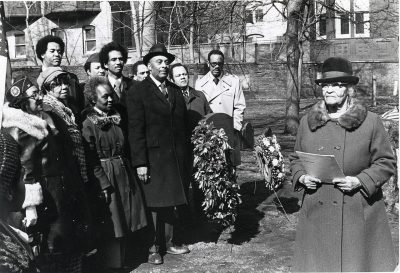On a snowy March evening 251 years ago, rising tensions in the city between U.S. colonists and British soldiers boiled over into a violent brawl on King Street: the Boston Massacre. It’s a day that lives in history books and on Advanced Placement U.S. History flashcards as an inciter of the American Revolution, and it’s a day close to home for Bostonians.

Crispus Attucks, who was of African and Native descent, was the first to die at the Massacre, according to Revolutionary Spaces. Though perhaps not a household name, activists say his legacy inspired a generation of civil rights leadership in the city, which carries on to this day.
Boston’s Revolutionary Spaces — which formed in January 2020 when Bostonian Society and Old South Association merged — is an organization working to preserve Boston’s historical legacy. The organization held a virtual panel with local activists Friday to discuss the significance of Attucks and Melnea Cass, a 20th century Boston civil rights activist.
Emma Strub, chief of staff at Revolutionary Spaces, wrote in an email that the event’s purpose — along with their new virtual exhibit “Reflecting Attucks” — was to highlight Boston’s influential activists of the past and present.
“Over the past 251 years, Attucks’s legacy has inspired generations of activists,” Strub wrote. “We wanted this March 5 event to be a celebration of all Ms. Cass accomplished, while also celebrating the accomplishments of just a few of Boston’s amazing Black women, including Monica Cannon-Grant, Kai Grant, and Malia Lazu.”
Lazu, a board member of Revolutionary Spaces, said she organized and moderated the panel in order to actively support Revolutionary Spaces’ mission to tell “the Black history of the revolution.” Lazu added she was surprised to see how receptive the community was to the conversation, with nearly 280 RSVPs to the event.
“My biggest takeaway is how excited folks were about this conversation and how they wanted to have it,” she said. “Folks were really excited about having a different kind of conversation.”
Lazu said she sees many correlations between the case of Attucks, who was shot during the Massacre, and the police brutality the Black community faces today.
“We’re in the middle of the Derek Chauvin trial for him killing George Floyd,” Lazu said. “There’s a similarity of state-sanctioned murder of Black bodies.”
She said Cass, a Roxbury civil rights activist, was working to address inequalities the pandemic has shown still exist to this day.
“Melnea Cass was marching to desegregate schools and to have work with dignity for people of color,” she said. “We’re seeing now with COVID and all of that stuff, that conversation is still needed. I think while there’s victories, we have yet to dismantle the racism that is in the DNA of this country and that’s why there’s still similarities.”
At the event, Monica Cannon-Grant, the CEO and the founder of the Violence In Boston Inc. — which works to end the violence marginalized communities face — said it’s important to remember activism continues even after the victories are achieved.
“One of the things I hear often is ‘okay, you marched, now what?’” Cannon-Grant said at the event. “For me, the ‘now what’ is the things we were marching about and advocating for, we actually continue to advocate for through legislation, through taking care of our people, similar to the Black Panther movement.”
Outside of marching, people can advocate for legislation, which is how the Eric Garner Anti-Chokehold Act and Andrew Kearse Act were passed to address police brutality, she said.
Cannon-Grant added activists from every generation make progress, but there is always more progress to be had — from education to housing to health care.
“My grandmother used to say civil rights is one in every generation,” Cannon-Grant said. “We just slightly push the needle forward each time, but it takes people fighting on multiple levels.”
In an interview, Lazu said there isn’t a “silver bullet” to ending all discrimination, but rather, there are multiple ways to be an activist — from shopping at minority-owned businesses to policy advocacy.
“I don’t want to say that there’s the ‘first thing’ we need to do,” Lazu said, “because I think the first thing we need to do is decide that we’re going to make a change and then we can make that change from anywhere.”
Lazu also said activism is more than just the work — it’s about humanity and connection.
“It’s about us coming together more and really getting ourselves a chance to be human together,” she said. “That’s how we’ll start seeing each other’s humanity, is by actually experiencing each other’s humanity.”


























































































































